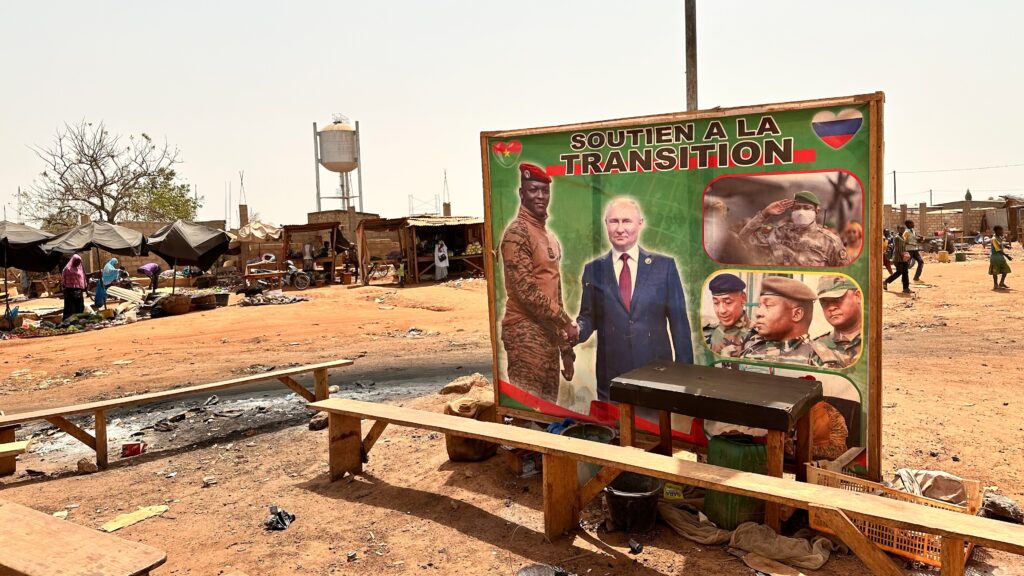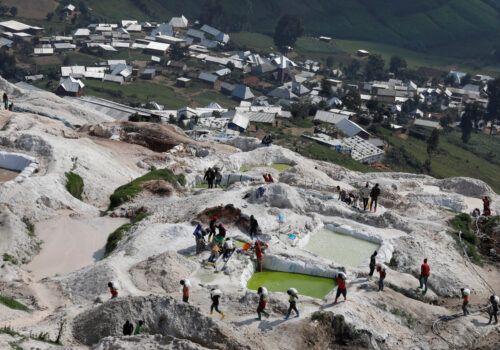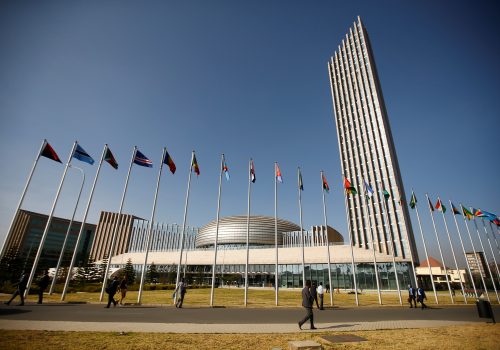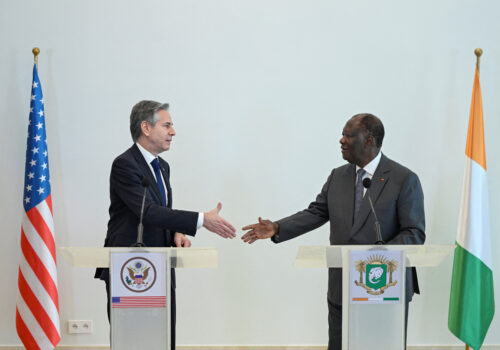It is not often that US President Joe Biden and Russian President Vladimir Putin espouse similar visions when it comes to foreign policy. Yet, at their respective summits with African leaders, they both focused extensively on their backing of the continent’s growing geopolitical heft on the world stage and went to great lengths to emphasize that they sought a forward-looking partnership with African countries, centered around cooperation.
Minerals often lie at the heart of this cooperation, and while the words the presidents said may have been similar, the meaning and context behind them couldn’t be more different.
Russia offers quid pro quo partnerships with promises of kinetic military, security, and political support—and assisted by faux anti-imperialist messaging. The United States, on the other hand, touts an approach that places emphasis on economic and community investment. There is a widening gulf emerging between the two models—and each model offers something that the other cannot.
Russia’s give—and take
Russia’s version of partnership has been aptly described as a “regime survival package,” in which the Russian government offers military and security assistance to struggling African governments; soon after come resource concessions for Russian companies.
This exchange has relied heavily on the Wagner Group, as the military company’s running operations allowed Moscow to distance itself via proxy. However, since the Wagner Group’s consolidation and rebranding into the Africa Corps (following the death of Wagner Group leader Yevgeniy Prigozhin), the exchange is arguably more direct and state-to-state, as Africa Corps activities are now reportedly being directed by the Russian state and managed by Russia’s military intelligence agency (the GRU) and the Kremlin. The Russian Defense Ministry, with the Africa Corps now reportedly in-house, is expanding its operations.
Russia’s offer of partnership has appealed particularly to governments in the Sahel. The Central African Republic is often viewed as the textbook case, with Wagner arriving in 2018 to push back rebels from the capital. Soon after, gold and diamond mining licenses were granted to a Russian-owned company that even the United Nations warns is “interconnected” with Wagner. And last year, Wagner helped Mali retake rebel-held areas in the north; in the months that followed, Russia and Mali signed agreements on gold refining and on oil, gas, uranium, and lithium production.
More recently, a contingent of Africa Corps personnel arrived in Burkina Faso in January to, according to the group’s Telegram channel, “ensure the safety of the country’s leader Ibrahim Traore and the Burkinabe people.” Two months later, Burkina Faso’s minister of energy, mining, and quarries told Sputnik Africa that Russian companies can become “strategic partners” in the extraction of minerals—such as gold, zinc, manganese, copper, graphite, and lithium—from mines and quarries.
Russia’s offer is currently supplanting other forms of partnership in Niger. The junta halted military cooperation with both France and the United States—whose militaries were there to help improve the security situation for Niger’s previous democratic leadership—pushing French troops to leave the country late last year and propelling the United States to agree to withdraw its forces. Earlier this month, Russian forces and military advisors arrived in Niger, equipped with an air defense system and other security equipment—a choice reflecting the fact that US forces were allocated between two airbases, from which they used drones to target militants. Once again, resources seem to be on the table in exchange for Russia’s partnership.
While there are some actual value-added projects being developed from Russia’s deals, such as the agreement with Mali on building a gold refinery, such deals are exceptions to the rule. A number of Russia’s grandiose economic promises to Africa have failed to fully materialize. The fact is that Russia’s economic potential for Africa cannot compete with that of the West. Russia contributes less than 1 percent of the global foreign direct investment going to the continent, and when it comes to trade revenue, it’s $17.7 billion (as of 2021) is dwarfed by the United States’ $65 billion and the European Union’s (EU) $295 billion. If economic measures were the only consideration in choosing partnership, Russia likely wouldn’t make any list.
The only market where Russia leads in Africa is the arms market. Last year, Russia overtook China as the largest supplier of arms to Sub-Saharan Africa.
Part of what makes Russia so appealing as a partner—in addition to its offers of security assistance—is Russia’s ability to market itself as anti-imperialist based on the Soviet Union’s support for African countries when they were fighting for independence. For example, when the junta seized power from a French-backed president, Russia’s Prigozhin framed the coup as a liberation from Western powers. African countries still have concerns about the remaining influence wielded by former colonial powers.
How Washington works
The United States, on the other hand, makes its appeal to African countries by promising partnership on local economic development—the critical minerals discussion is only part of that partnership. The US approach is reflected in projects such as the Lobito Corridor—which is intended to make transport, including of critical minerals, from the Democratic Republic of the Congo and Zambia to Angola easier. Alongside its mineral extraction initiatives, the United States is eager to showcase regional and community benefits for its projects.
In addition, the United States often cooperates and coordinates with its European partners when approaching investment and activity in Africa. For example, Zambia and the Democratic Republic of the Congo have signed similar agreements with both the United States and EU in which the countries agree to promote responsible mineral extraction activities that build local capacity and to bring more of the minerals value chain (including processing, manufacturing, and assembly) to the region.
Partnership with Europe can be an effective strategy for the United States, as such an approach gathers more funds, capacities, and markets. Yet, there are downsides. By tying itself with Europe, the United States ties itself to a colonial legacy. In Niger, the junta took power and quickly sought to evict French forces and EU partners—but not US forces (at least initially). This generated tension in the US-France relationship and underscored the extent to which the United States is willing to deviate from cooperation with its partners to maintain engagement in Africa. Such a method lines up with the revamped US Strategy Toward Sub-Saharan Africa under which the Biden administration has been adamant that it is seeking to partner with African countries on equal footing and that it will not treat Africa as a great-power battleground. Europe is itself aware of its history. A former Latvian prime minister, for example, called for EU members without colonial pasts to lead the bloc’s engagement with countries across Africa.
The United States, for the most part, holds its engagement conditional on the health of each country’s democracy. In the case of Niger, the United States suspended financial assistance, saying that “Any resumption of US assistance will require action . . . to usher in democratic governance in a quick and credible timeframe.” The United States has also not shied away from terminating partnership in programs such as the African Growth and Opportunity Act (which provides duty-free entry for certain products) when the country in that partnership has seen an erosion in democratic governance, human rights, and freedoms. The United States shouldn’t shy away from doing so; but this is not a priority Russia shares.
To be fair, the United States, often alongside its European partners, does collaborate on military affairs with African countries. For example, the United States and United Kingdom joined African democratic partners in conducting a large military drill in Kenya. Many African countries, especially those that are partners with the United States, recognize the risk Russia’s support poses. Some have been vocal in making their opposition to Russia’s geopolitical actions known.
Yet, deadly incidents (and the resulting political fallout)—such as the 2017 Tongo Tongo ambush or the 1993 Battle of Mogadishu—have doused US enthusiasm for assistance with direct combat. The United States focuses on supporting roles with airpower, intelligence sharing, and training. Even France, after deploying troops across the Sahel for years in Operation Barkhane, was unwilling to deploy its forces to Niger during the coup to support the president it had backed. Compare that to Russia, which seems willing to sustain partnership with blood. When the Central African Republic’s president changed the constitution last year to abolish term limits, Russian forces in the country increased their presence and provided support and security services to the president.
The United States (especially when joining with its allies) is an economic power, and that is attractive for African countries seeking much needed domestic development and value addition. Yet, US partnership does have its limitations. Should a country’s domestic policies run afoul of American principles, partnership is near impossible. Unlike Russia’s limitations, the United States’ are largely self-imposed.
Weighing the choice
Going forward, African countries must choose wisely between the United States (and its offer of economic and development support) and Russia (and its offer of direct military support) in their search for a partner on critical minerals.
Juntas and dictatorships will likely choose Russia, even if offered another choice (which seems unlikely). Russia offers them the equipment and military support they need to fight insurgent and terrorist groups.
The West will need to closely watch democratic countries in Africa. Russia is looking to make the choice easier by deploying disinformation. France has accused Russia of even staging atrocities and framing the West to promote its narrative.
As for what the United States could do: It could theoretically start adding direct kinetic security support to its offer. However, the United States isn’t likely to align itself with military leaders who trampled democracy on their road to power, and it isn’t very likely to deploy forces to protect them. The United States could, theoretically, also turn to the private sector—supporting the efforts of private military companies that are already operating in the continent. But the government would still be limited, rightly so, by laws that restrict it from supporting nondemocratic regimes.
With African minerals in high demand, Russia and the United States will continue to offer what the other can’t.
Alexander Tripp is the assistant director for the Atlantic Council’s Africa Center.
Further reading
Mon, Mar 18, 2024
The critical-minerals boom is here. Can Africa take advantage?
AfricaSource By Alexander Tripp
The critical minerals discussion on extraction, national security, and supply chains will move past Africa unless the moment is seized.
Tue, Apr 2, 2024
Why Africans hold the future of global democracy in their hands
AfricaSource By Rama Yade
By the end of 2024, the face of political Africa will—theoretically—no longer be the same. With nineteen elections scheduled this year, the continent will see presidents leave who were elected more than ten years ago (in Senegal and Ghana), uncertain civilian transitions (in Chad, Mali, and Burkina Faso), high-stakes elections (as in South Africa), and […]
Tue, Feb 6, 2024
No more business as usual: The US needs a broader engagement strategy in West Africa
AfricaSource By Michael Shurkin
US influence in the Sahel has waned, and Washington needs to rethink its engagement there and in West Africa as a whole.
Image: Photo via Christina Peters/dpa via Reuters Connect



